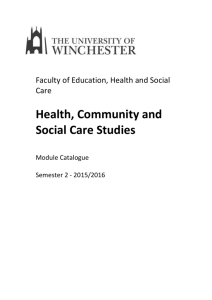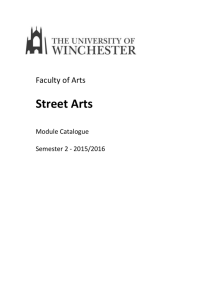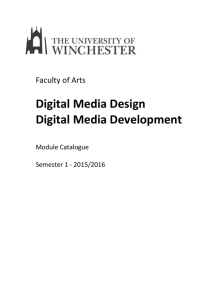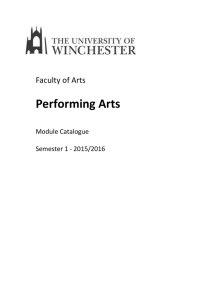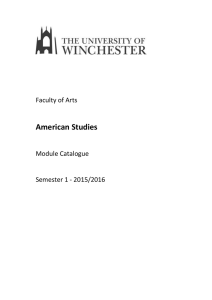Marketing
advertisement
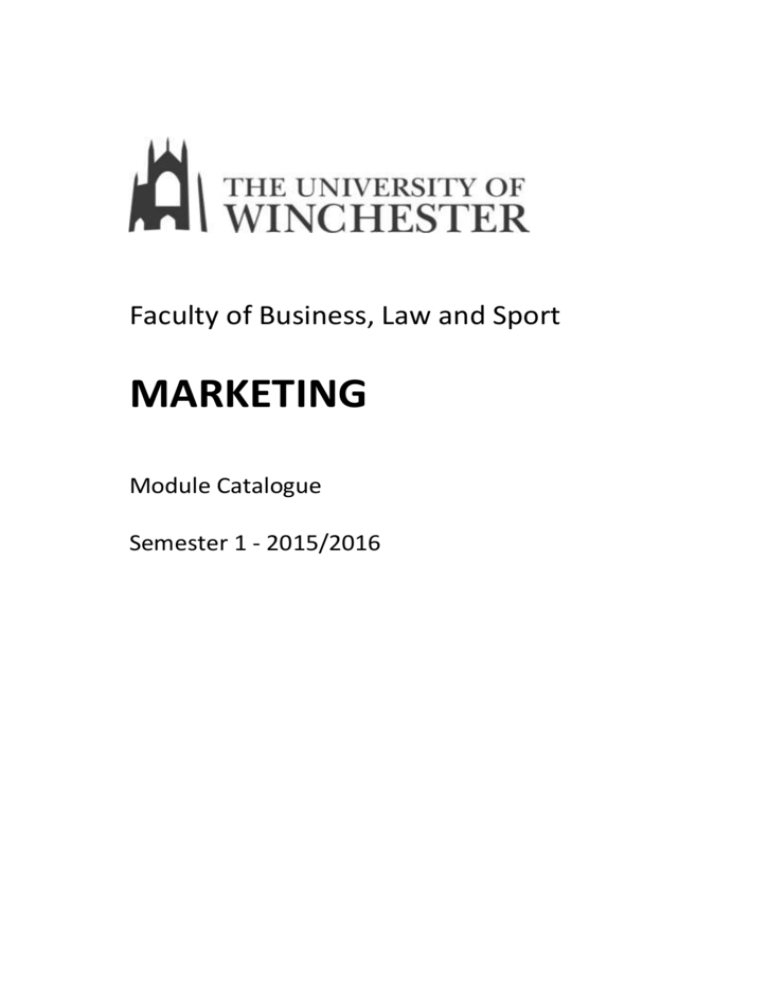
Faculty of Business, Law and Sport MARKETING Module Catalogue Semester 1 - 2015/2016 Module Code: BS1967 Module Name: Understanding Markets Module Credits: 15 No. of Periods: 1 Level: Level 4 Module Tutor: Module Description: An understanding of markets is central to the study of business. This module takes a sociological perspective of markets and market economics, encouraging discussion of how individual consumers, industrial firms, governments, educational institutions, mass media, NGOs and other networks and organisations affect consumer culture and shape market dynamics. Students will consider current consumer trends and the circumstances in which markets succeed or fail. Consumer dependence on social and economic structures will be explored, along with trends towards increasing consumer power, consumer participation and political consumerism. The implications of new and emerging markets in public sectors such as healthcare and education will also be discussed, as will historical and cultural aspects of the move towards consumerism. The module provides an introduction to a range of data sources and analytical tools concerning market and consumer trends. Specific to: Business Management Business Management Joint Business Management with Enterprise and Innovation Fashion, Media and Marketing Sports Business and Marketing Assessments: 001: Report (written assignment) Availability: Occ. A Year 15/16 Semester S1 100% Day Time Module Code: BS2985 Module Name: Marketing Management Module Credits: No. of Periods: Level: Module Tutor: 15 1 Level 5 Martina Goudie-Hutton Module Description: This module will concentrate on contemporary marketing theories, concepts and techniques relevant for understanding and contextualising marketing management in modern organisations. Students will develop an ability to appraise theoretical perspectives of marketing management and their application to multiple organisational contexts. The module will provide an overview of the analytical marketing principles relating to: marketplace understanding (market and competitor analysis techniques); designing marketdriven strategy (market development, managing innovation) and marketing management decisions relating to brand management and internationalising. The module’s analytical and applied emphasis will prepare students for further study of this discipline at a strategic level. Specific to: Marketing Assessments: 001: Availability: Occ. A Analytical report (4500 words maximum) Year 15/16 Semester S1 100% Day Time Module Code: BS2987 Module Name: Creativity, Design and Innovation Module Credits: 15 No. of Periods: 1 Level: Level 5 Module Tutor: Module Description: Successful and sustainable organisations depend upon their ability to generate creative new products and services, and finding new ways of doing business. Entrepreneurial ventures rely upon new ideas to establish themselves in the market. Without creativity, design and innovation established organisations would lose sources of advantage to competitors. The processes through which creativity, design and innovation occur, and how these can be encouraged at individual, team and organisation level, are, therefore, important concerns for management. Creativity, design and innovation can be seen from different perspectives, including responsible management, marketing, leadership, knowledge and learning, finance, operations, and strategy. As such, study of creativity, design and innovation helps to develop a broad appreciation of the interconnections between apparently diverse business and management subject areas. Specific to: Business Management Business Management with Enterprise and Innovation Event Management Marketing Assessments: 001: Report (4500 words maximum) Availability: Occ. A Year 15/16 Semester S1 100% Day Time Module Code: BS2988 Module Name: Integrated Marketing Communications Module Credits: 15 No. of Periods: 1 Level: Level 5 Module Tutor: Module Description: This module considers both the theoretical and practical aspects of integrated marketing communications. Theories of communication influence are explored, with emphasis on how the communication tools (advertising, personal selling, public relations, sales promotion, direct marketing and digital marketing) can be synthesised, to enable the delivery of consistent brand messages across a multiple of marketing channels. The importance of communication objective setting, budgeting, and the role of agencies are also key elements of this module. Students will be encouraged to identify the salient characteristics of target audiences to facilitate the utilisation of relevant communication tools in order to amplify vital marketing messages. Specific to: Business Management Event Management Event Management Joint Marketing Assessments: 001: Presentation Availability: Occ. A Year 15/16 100% Semester S1 Day Time
